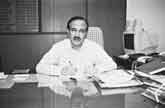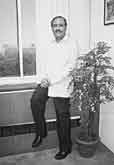
The Master Bureaucrat
 THE 27th chief secretary of Maharashtra, AJIT NIMBALKAR, is not just another bureaucrat. Having held key positions both at the centre and state levels, this 58-year-old war-horse has enjoyed an exposure which could easily be an aspirant's dream and the practitioner's envy. Ever since he began his career as the asst.
THE 27th chief secretary of Maharashtra, AJIT NIMBALKAR, is not just another bureaucrat. Having held key positions both at the centre and state levels, this 58-year-old war-horse has enjoyed an exposure which could easily be an aspirant's dream and the practitioner's envy. Ever since he began his career as the asst.
district collector of Panvel, he has never looked back. Be it his stint as the MSEB chairman or the vice-chairman of MSRDC or his positions in the Labour and Home ministries, he has carved a niche for himself as an adept administrator with an holistic approach.
"The charm of the civil service is timeless and the challenges of bureaucracy fascinating," he tells SUDHIR RAIKAR over an hurried but elaborately packed home-made lunch in his spacious Mantralaya office.
Looking back, does a trip down memory lane make you happy?
Undoubtedly, yes. Right from my childhood, it was my burning desire to join the Indian Administrative Service. This was actually the extension of my father's dream, an IAS aspirant himself, who actually joined the Indian Army. Since two of my brothers followed his footsteps, it was left to me to fulfill his dream. I still remember a school debate when we were asked to spell out our ambitions. Amidst the crowd of would-be doctors and engineers, I was the only guy aspiring for a collector's position.
So when you cleared the IAS exams, your family ambition was finally fulfilled?
Yes. But it was not easy. I worked towards it right from my college days. When I opted for the Arts stream in Mumbai's Sydenham College despite excellent scores in Math and Science, my college principal was pretty amused. But the reason was clear in my mind -- unlike today, a degree in public administration was considered a must for civil services. Hence, I did my MA in Political Science after graduating in the same faculty from the Mumbai University. The rest of the journey was clear. It was long before I was a proud member of the 1967 IAS cadre.
Has the Indian bureaucracy evolved over the years?
It is a natural phenomenon that an entity has to adapt to the changing environment around it. And the civil services are no exception. On one hand, the political instability and the rising communal conflicts across the country have made the bureaucrat's role even more taxing and challenging. Secondly, people have become more aware of their rights and fierce in their expectations. This along with extensive media coverage of political events has changed the traditional perception of the government -- that of solely as a provider. No longer a faceless machinery, the government now plays a far greater role as a facilitator as well. In this dynamic environment, it was but obvious that the role of bureaucracy witnessed a sea change.
In your opinion, how can the bureaucrat ensure an effective administration?
I see the civil servant playing a vital role in two capacities. One as an advisor on policy making itself and two in the customary capacity ensuring the implementation of the said policies and the resultant administration. 
But the advisory role in particular is more often marred by political pressures and prejudices?
Compromise is an inevitable part of any public activity. As far as bureaucrats are concerned, we get a mixed bag. Your advice, at times, is accepted with open arms, sometimes it's the other way round. While you take inevitable facts in your stride, you also have to ensure that you do justice to your role. As far as the political compulsions of the powers that be are concerned, it is not always a sorry situation. There are many enlightened members in government with sound knowledge of the most intricate issues of their portfolios. So as I said, it's a mixed bag.
What has been your personal experience in all your stints?
It has been a rewarding experience. I have enjoyed the diversity of all my roles. Be it as the district collector, the head of any public utility undertaking or at the centre, the challenge of each position has enriched my experience. But I have personally relished all work of developmental nature. In that respect, the stints at MSRDC and MSEB have been extremely satisfying. Managing the operations of the 1,27,000-strong mammoth undertaking was an enlightening experience. Besides, the stint in the North-Eastern states was very eventful. In fact, I see one of my major achievements during this period when I was actively involved in the peace talks and negotiations of insurgency ridden states.
What is your opinion on the current debate over MSEB's privatisation? Was the debate on during your tenure?
As this is a matter outside my purview, I would not like to comment on the same. During my tenure, proposals of part-privatisation, viz, that of the Generation activity were being discussed.
Your appointment to the chief secretary's post is attributed to your so-called rapport with NCP President Sharad Pawar. More so, since you bypassed senior officers including Municipal Commissioner Karun Srivastava for the said post.
I have had a good rapport with Mr. Pawar but so do I have with many other leaders. In any case, I don't want to comment on the gossip that the press usually loves to lap up. And what does one mean by bypassing? It is ridiculous to use that term for something which is not decided on seniority. In fact, none of my equally competent contemporaries in the so-called "race" have had any objection on this front. But since it's a ripe input for the gossip factory, it is dramatised and shown as a rat-race between individuals.
What are your priorities in your new role?
Everything on my agenda is on priority. Maharashtra is a dynamic state, so are the issues before the state. But more specifically, I would like to focus strongly on the infrastructural development of the state.
In that respect, does the name T. Chandrashekhar makes you more confident of concrete results in Mumbai?
He is an outstanding official with remarkable achievements, there's no doubt about it. But again, why single out one individual. There are many more competent administrators who ceaselessly contribute to the team effort. It would be unfair to ignore the collective effort.
How do you spend your leisure time, if you ever get any?
With my hectic schedule, it's difficult to find time for recreation. Nevertheless, I relish reading on diverse issues from fact to fiction. At one time, P.G. Woodhouse was my favourite author. When it comes to music, I have always enjoyed listening to old numbers of Lata Mangeshkar and Asha Bhosle. Of course, I love spending time with my family and friends.